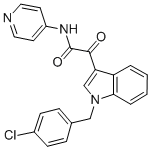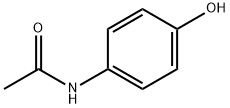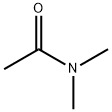Indibulin
- CAS NO.:204205-90-3
- Empirical Formula: C22H16ClN3O2
- Molecular Weight: 389.83
- MDL number: MFCD05861105
- SAFETY DATA SHEET (SDS)
- Update Date: 2024-07-02 08:55:00

What is Indibulin?
Description
Indibulin (D-24851; ZIO-301), a novel synthetic small molecule microtubule inhibitor, destabilizes microtubules and has antitumor activity but does not exhibit neurotoxicity in preclinical animal studies. Indibulin reduces inter-kinetochoric tension, produces aberrant spindles, activates mitotic checkpoint proteins Mad2 and BubR1, and induces mitotic arrest and apoptosis. The drug can discriminate between highly posttranslationally modified tubulin present in mature neuronal microtubules, and less-modified tubulin present in immature neuronal or nonneuronal microtubules.
The Uses of Indibulin
Indibulin is a microtubule destabilizer. Acts as a chemotherapeutic drug used in the treatment of breast cancer and other heterogenous and aggressive types of cancer.
What are the applications of Application
Indibulin is a microtubule destabilizer
Biological Activity
Indibulin is a microtubule destabilizer that blocks tubulin polymerization (IC50 = 0.3 μM). Blocks cell cycle progression at metaphase and displays antitumor activity against a variety of malignancies in vitro (IC50 values ranging from 0.036 - 0.285 μM). Induces complete tumor remission in the Yoshida AH13 rat sarcoma model in vivo. Lacks neurotoxicity due to an ability to discriminate between posttranslationally modified tubulin in mature neuronal microtubules and less-modified tubulin present in immature neuronal or nonneuronal microtubules. Displays oral availability and efficacy towards MDR tumor cells.
storage
Desiccate at -20°C
Mode of action
Indibulin binds to a site on tubulin that is different from taxane- or Vinca alkaloid-binding sites, destabilizing tubulin polymerization and inducing tumor cell cycle arrest and apoptosis. This agent has been shown to be active against multidrug-resistant (MDR) and taxane- resistant tumor cell lines.
References
Indibulin, a Novel Microtubule Inhibitor, Discriminates between Mature Neuronal and Nonneuronal Tubulin
https://www.rndsystems.com/products/indibulin_3728
https://pubchem.ncbi.nlm.nih.gov/compound/2929
Properties of Indibulin
| Density | 1.31±0.1 g/cm3(Predicted) |
| storage temp. | Sealed in dry,Store in freezer, under -20°C |
| solubility | DMSO:33.25(Max Conc. mg/mL);85.29(Max Conc. mM) |
| form | A solid |
| pka | 9.38±0.70(Predicted) |
| color | Off-white to yellow |
Safety information for Indibulin
Computed Descriptors for Indibulin
New Products
Tert-butyl bis(2-chloroethyl)carbamate 4-Methylphenylacetic acid N-Boc-D-alaninol N-BOC-D/L-ALANINOL N-octanoyl benzotriazole 3-Morpholino-1-(4-nitrophenyl)-5,6-dihydropyridin- 2(1H)-one Furan-2,5-Dicarboxylic Acid DIETHYL AMINOMALONATE HYDROCHLORIDE 1,1’-CARBONYLDIIMIDAZOLE R-2-BENZYLOXY PROPIONIC ACID 1,1’-CARBONYLDI (1,2-4 TRIAZOLE) N-METHYL INDAZOLE-3-CARBOXYLIC ACID (2-Hydroxyphenyl)acetonitrile 4-Bromopyrazole 5-BROMO-2CYANO PYRIDINE 5,6-Dimethoxyindanone 5-broMo-2-chloro-N-cyclopentylpyriMidin-4-aMine 2-(Cyanocyclohexyl)acetic acid 4-methoxy-3,5-dinitropyridine 1-(4-(aminomethyl)benzyl)urea hydrochloride 2-aminopropyl benzoate hydrochloride diethyl 2-(2-((tertbutoxycarbonyl)amino) ethyl)malonate tert-butyl 4- (ureidomethyl)benzylcarbamate Ethyl-2-chloro((4-methoxyphenyl)hydrazono)acetateRelated products of tetrahydrofuran








You may like
-
 2033-24-1 98%View Details
2033-24-1 98%View Details
2033-24-1 -
 1975-50-4 98%View Details
1975-50-4 98%View Details
1975-50-4 -
 2-HYDROXY BENZYL ALCOHOL 98%View Details
2-HYDROXY BENZYL ALCOHOL 98%View Details
90-01-7 -
 2-Chloro-1,3-Bis(Dimethylamino)Trimethinium Hexafluorophosphate 221615-75-4 98%View Details
2-Chloro-1,3-Bis(Dimethylamino)Trimethinium Hexafluorophosphate 221615-75-4 98%View Details
221615-75-4 -
 61397-56-6 CIS BROMO BENZOATE 98%View Details
61397-56-6 CIS BROMO BENZOATE 98%View Details
61397-56-6 -
 14714-50-2 (2-Hydroxyphenyl)acetonitrile 98+View Details
14714-50-2 (2-Hydroxyphenyl)acetonitrile 98+View Details
14714-50-2 -
 118753-70-1 98+View Details
118753-70-1 98+View Details
118753-70-1 -
 733039-20-8 5-broMo-2-chloro-N-cyclopentylpyriMidin-4-aMine 98+View Details
733039-20-8 5-broMo-2-chloro-N-cyclopentylpyriMidin-4-aMine 98+View Details
733039-20-8